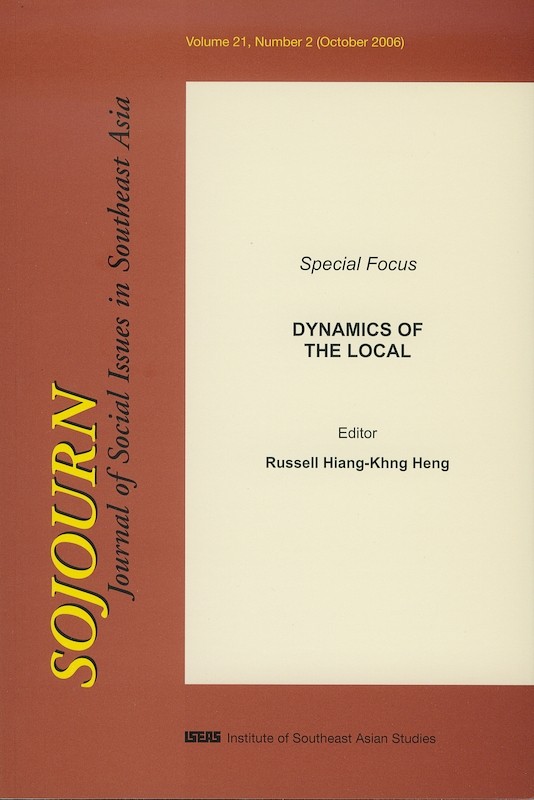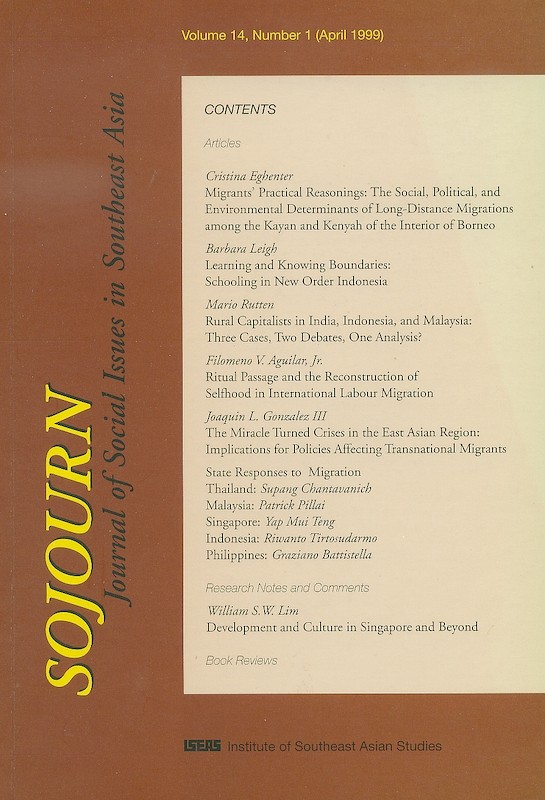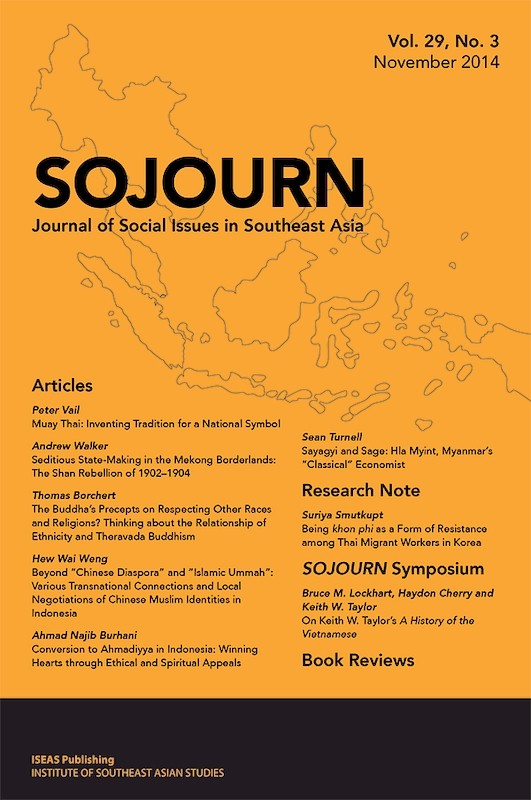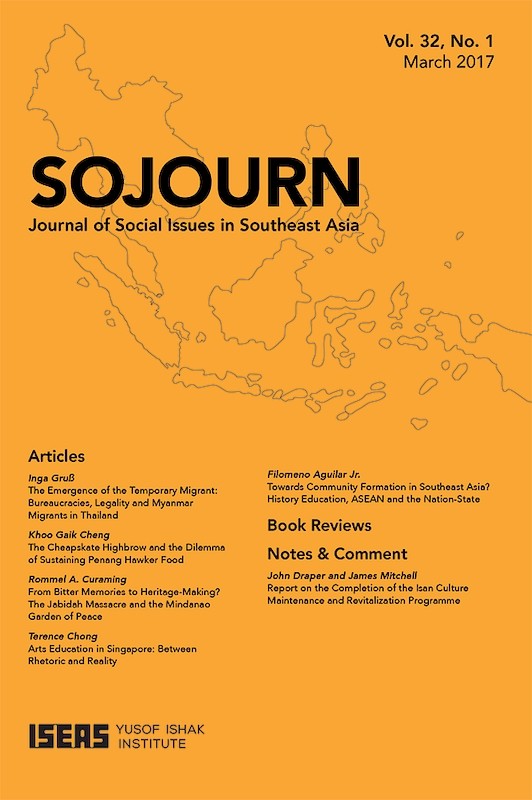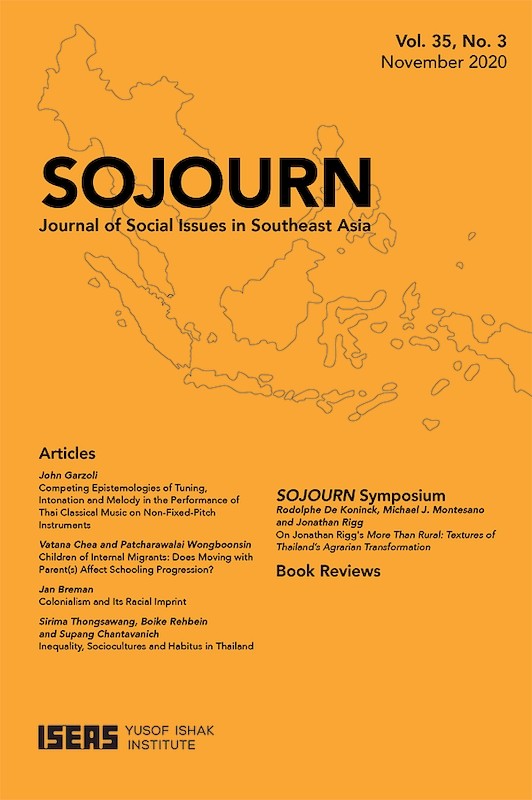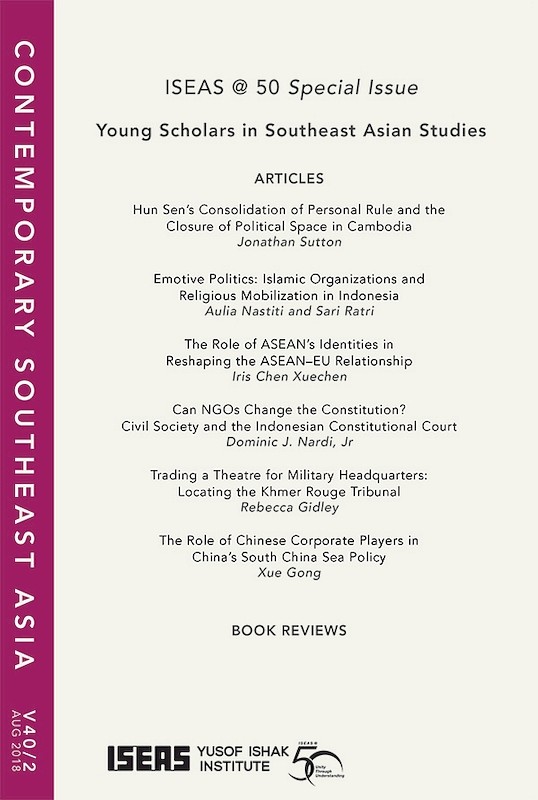SOJOURN: Journal of Social Issues in Southeast Asia Vol. 28/2 (July 2013)

Date of publication:
July 2013
Publisher:
Institute of Southeast Asian Studies
Number of pages:
200
Code:
SJ28/2
About the publication
Contents
-
SOJOURN: Journal of Social Issues in Southeast Asia Vol. 28/2 (July 2013)
[Whole Publication] -
Preliminary pages
- ARTICLES
-
The Regionalization of Local Buddhist Saints: Amulets, Crime and Violence in Post–World War II Thai Society, by Chalong Soontravanich, author see abstractThe increase in crime and violence and the rising popularity of so-called Buddhist amulets in Thai society after World War II were directly related. While the cult of amulets had been long and widely practised among the Thai, it was only during the war years and thereafter, when crime and violence surged throughout the country, that the cult of Buddhist amulets grew dramatically in popularity. In the course of this increase in the popularity of amulets, those with the image of the Buddha or that of a Buddhist saint clearly established their supremacy over other non- or quasi-Buddhist amulets. Many highly respected “local” monks, living or dead, whose sanctity and amulets had previously been known largely to a closed circle of local followers now became more widely known. The prestige of the local saints grew and expanded beyond their local communities, encompassing a wider geographical region. The period saw what one may term the regionalization of local Buddhist saints in Thailand.
-
Human Rights and (Im)mobility: Migrants and the State in Thailand, by Annuska Derks, author see abstractMigration and human rights stand in ambiguous relation to each other. Different, at time contradictory, conceptions of human rights in the context of migrant labour in Thailand reveal the paradoxical role of the state and the law in the protection of migrants’ rights. The state is held accountable for the protection of the human rights of migrants residing in its territory, even as it at the same time creates the conditions that may result in those migrants’ exclusion from protection. Examination of this exclusion in the particular case of Cambodian migrant workers in Thailand and their efforts to enact what Hannah Arendt called “the right to have rights” reveals the chaos of human rights praxis in everyday migrant life.
-
Categorizing Gender in Queer Yangon, by David Gilbert, author see abstract“Queer” research invariably entails practices of labelling and ascription, often through the adoption of local vernacular categories from the field. In Myanmar, practices of labelling are commonly unarticulated, and local terms are contested. Acts of categorization are thus challenged. The two dominant, non-gender normative subject positions are “open”, denoting a feminine image, and “hider”, denoting a masculine image. An examination of the elements of external image, internal mind/heart and karma and of the boundaries between Burmese “open” and “hider” subject positions permits a better understanding of these positions. While Burmese “queer” categories mark out a field of gender liminality, their use for individual ascription complicates existing conventions.
-
Vestigial Pop: Hokkien Popular Music and the Cultural Fossilization of Subalternity in Singapore, by Liew Kai Khiun, Brenda Chan, authors see abstractAs part of its modernization project, the postcolonial Singapore state has systematically marginalized the vernacular cultures of the country’s colonial-era immigrant society. Nevertheless, Hokkien popular music has persisted not only in the street festivals that were so characteristic of the colonial port city but also in local movies. A combination of official discouragement and changes in education levels and demography has diminished the significance of Hokkien music in the country. Instead of the mark of evolving, living culture, Hokkien music resembles more of a vestigial articulation of working class tribulations and of middle class nostalgia and reaction to the vicissitudes of capitalist modernity in Singapore. Critical scrutiny of the unchanging replay of traditionalized narratives in texts and live street performances of getai, as well as of theme songs from Singaporean films and Taiwanese soap operas, demonstrates the process through which pop music becomes vestigial.
-
Friction and Security at the Khmer Rouge Tribunal, by Alexandra Kent, author see abstractA hybrid judicial tribunal was inaugurated in Phnom Penh in 2006 to try those most responsible for the mass crimes perpetrated during the period of Khmer Rouge rule in Cambodia, 1975–79. Since the inception of the tribunal, there has been regular friction between the international and national sides, some of which has led to considerable animosity. In 2012 the international Co-investigating Judge resigned after only a few months in office, claiming that he had found himself in a hostile environment and had been unable to carry out his duties. Impasses of this kind arise in the specific social context in which security has come to be configured and managed in Cambodia, in part with the complicity of foreign powers. Greater appreciation of the historical background and social context that frame the lives of court staff would enable us to have more realistic expectations of future hybrid tribunals.
- RESEARCH NOTE
-
"Assimilationism" versus "Integrationalism" Revisited: The Free School of the Khong Kauw Hwee Semarang, by Christine Chan, author see abstractDespite the Indonesian state’s unfavourable policies towards Chinese culture and religion, the free school run by the Semarang Confucian Society has survived across more than six decades. Its history from 1950 to 2010 serves as a case study of Chinese Indonesian adaptability. It also provides a vehicle for revisiting the debate of the late 1950s and early 1960s between “assimilationists” and “integrationists” over the position of Chinese in the Indonesian nation. The school’s longevity was the result of its administrators’ undertaking various measures to ensure not only that they would escape being penalized by the state for their Chinese ethnicity and religion but also that they would gain official acceptance for providing a valuable service to the Indonesian nation. Viewed from the perspective of today’s more culturally inclusive Indonesia, the case of the Taman Kanak-kanak-Sekolah Dasar Kuncup Melati offers an example of both Chinese survival and Indonesian adaptability.
- BOOK REVIEWS
-
BOOK REVIEW: Thailand's Political Peasants: Power in the Modern Rural Economy by Andrew Walker, by Benedict J Tria Kerkvliet, author
-
BOOK REVIEW: The Lovelorn Ghost and the Magical Monk: Practicing Buddhism in Modern Thailand by Justin McDaniel, by Martin Platt, author
-
BOOK REVIEW: Student Activism in Malaysia: Crucible, Mirror, Sideshow by Meredith L. Weiss, by Lee Hock Guan, author
-
BOOK REVIEW: Global Movements, Local Concerns: Medicine and Health in Southeast Asia edited by Laurence Monnais and Harold J. Cook, by Loh Kah Seng, author
-
BOOK REVIEW: Images of a Forest People: Punan Malinau — Identity, Sociality, and Encapsulation in Borneo by Lars Kaskija, by Lee Poh Onn, author
-
BOOK REVIEW: Global Filipinos: Migrants' Lives in the Virtual Village by Deirdre McKay, by Sri Ranjini Mei Hua, author
-
BOOK REVIEW: Thailand's Hidden Workforce: Burmese MIgrant Women Factory Workers by Ruth Pearson and Kyoko Kusakabe, by Niti Pawakapan, author
-
BOOK REVIEW: Labour Migration and Human Trafficking in Southeast Asia: Critical Perspectives edited by Michele Ford, Lenore Lyons and Willem van Schendel, by Sallie Yea, author

